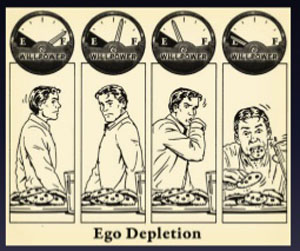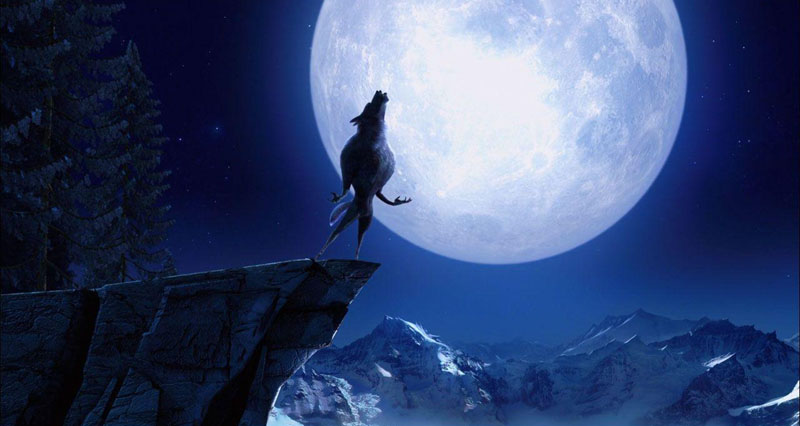Werewolf Willpower

Key: Being a werewolf balance of desire, control and relief keeps us healthy.
Living It: Set wellness goals. Succeed. Cope healthily with the effort we put out. Howl with pride. Repeat.
Clinical Concept: Developing adaptive responses to ego fatigue in long term health management.
“Willpower is what separates us from the animals. It’s the capacity to restrain our impulses, resist temptation – do what’s right and good for us in the long run, not what we want to do right now.”
– Roy Baumeister, Social Psychologist
Werewolves. Traditionally speaking, are just like you and me most of the month…but when the moon is full, or on Halloween; their inner beast comes to the fore. They shift and hands become claws, mouths become muzzles and eyes—once quite human—glow in the darkness as those of the wolf.
That’s the traditional werewolf. We’ve seen over time from Lon Cheney to American Werewolf in London. In Teen Wolf, Twilight, Underworld and an increasing number of television representations well beyond Oz from Buffy the Vampire Slayer, the modern werewolf still must fear the moon’s sway, but they are much more about self-control. The modern werewolf is a picture of human mastery of animal desire.
In terms of maintaining long term wellness goals, we can learn a great deal from werewolves this Halloween. They have it hard, resisting the beast, since “a growing body of research shows that resisting repeated temptations takes a mental toll,” According to the American Psychological Association. “Some experts liken willpower to a muscle that can get fatigued from overuse,” and when it does, they call it willpower depletion or ego depletion.

Personally, I love the term “ego depletion” over “willpower” because I feel it conveys the true emotional weight of the state—and I say this as a person who has been there. After maintaining a healthier weight for over seven years, I’ve started to note a feeling of exhaustion that I must be vigilant against, much like the pull of the moon. To give in would mean ravaging the kitchen snack cabinet or restaurant dessert cart. It’s not just my willpower that’s tired, it’s more like all of me. My inner wolf—my id—is strong, and my super-ego is ready to pounce in criticism of any failure, but my ego is worn out. And the full moon is rising.
Ever feel like that? I bet you have. Let’s find out why, and let’s fight back!
The term was coined in 1998 by social psychologist Roy Baumeister and his team. They studied people in many different rounds of experiments and found that our willpower which is our ego at work, seems to be a finite resource. It’s not just about food, either. Any sustained choice that is a fight against our impulses can deplete our ego. In one study participants able to resist fresh-baked cookies had difficulty with puzzles. Others who suppressed their thoughts had less emotional control. Those who were able to suppress their emotions had less stamina in physical tests (APA).
Baumeister’s studies birthed a multitude more over the last 20 years, examining, and most often supporting, various aspects of the ego depletion theory. I hunted several them, sniffing out the trail, in lupine pursuit of a model that would help me understand ego depletion in the long term. I found the Process Model, which says that when we successfully use ego strength to overcome temptation our motivation to indulge goes up and our motivation to control ourselves goes down. It was studied by a collaboration of Australian Universities “to test…relationships between ego depletion, motivation, desire, and self-control” and increase “understanding of how to prevent self-control failures and improve outcomes in a variety of behavioural domains, including academic and work performance, overspending, smoking, alcohol and drug abuse, relationship problems, as well as unhealthy snacking” (Haynes, et al., 2016)
We all have a wolf inside us be it the wolf of Twinkies, drink or surfing the net at work. Ego depletion is the result of successfully fighting that wolf over and over again. In the process we not only get depleted, but we think “hey, I did the last ten times, this once won’t hurt” or “I deserve it” (motivation to indulge) and “not having a heart attack is important, but not as tasty as that cheese steak looks!” (motivation to control ourselves). Haynes found that this was true regardless of desire—all parties studied desired the snacks her colleagues tempted them with, some could just resist their wolves longer and stronger.
There’s No Silver Bullet
“Some werewolves are hairy on the inside.”
– Stephen King, American Novelist

“Desire strength predicted higher snack intake,” the multi-university Australian study found. Did we really need a study for that? In a way, yes, because what they found was that desire level remained consistent regardless of whether participants egos were depleted or not. The wolf inside was just as strong, the cigarette just as enticing, the Candy Crush bout just as alluring. Alas, there’s no silver bullet. The wolf cannot be killed. But there are two factors that can help us become stronger humans.
Mark Muraven, PhD, of the University at Albany found that “people who felt compelled to exert self-control in order to please others…were more easily depleted than people who were driven by their own internal goals and desires,” according to the APA. Thus, our own ego plays a role in our ego depletion. “Those who are in touch with themselves may be better off than their people-pleasing counterparts,” he said.
Once we’re in touch with ourselves, we need to stay in sight of our goal. “After one act of self-control…ego depletion results in a stronger motivation to seek immediate gratification and a reduced motivation to control those urges,” Haynes clarified, “ego depletion does not moderate the effect of desire and motivation toward longer-term goals.” Even though it may feel that way, we’re not throwing in the towel when we wolf-out. Ego depletion does not mean we’ve given up, it means we’ve momentarily given in. This is where knowing ourselves meets accepting that we all have werewolf moments and refocusing on our overwhelming successes. Remember, if we weren’t fighting and winning to begin with, our ego would never have become depleted. We would be running as a desire-driven wolf all the time.
Taming the Wolf
“If being a werewolf is really a curse, you’ve got to treat it honorably. If werewolves are going to carry on, there has to be an incredibly powerful force. There is the business of the craving, the hunger for the kill. It has to be deeply pleasurable and more than an appetite for meat.”
– Glen Duncan, British Author
We’ve come a long way from Lon Cheney’s original portrayal of the lonely lycanthrope. As we said, the modern werewolf is a much more nuanced creature; far from a mindless animal, the modern werewolf can be noble, strong and a hero.
Balance between wolf and man is the key for werewolves. A harmony between both natures. The same is true for us mortals fighting to maintain a health habit for life. Many studies have found that we can re-invigorate our willpower by being flexible in other arenas that don’t run counter to our goals. Haynes’ team recommends that people “balance periods of control and leisure, so that after enacting control, they become more motivated toward rest” rather than indulging in their unhealthy pursuit. Have a big diet win? Great! Celebrate with a nap, a book, hobby or a gentle walk. Don’t have diet problems but perhaps are managing another craving like drugs, sex or alcohol? “Restoring glucose appears to help reboot run-down willpower,” according to the APA, so a measured amount of sweets may address the depletion of sugar that happens in the brain when we exert our ego.

Haynes and her partners found that the best way to tame the wolf is to focus on reducing the desire for the unhealthy choice, since that pull remained a constant regardless of the current power level of our egos. Basically, hang the wolfsbane around our temptation to keep the wolf away and stay focused on our goal. This can be done a variety of ways such as distracting ourselves, avoiding tempting situations or removing items.
And as we stay focused, the APA found that striving onward with “a good mood can overcome some of the willpower depletion effects normally seen after exercising self-control.” So, let’s strive in high spirits and with pride.
As I reflect on the data above and how we all fight the wolf within, I’m noticing the one facet of the werewolf story that we haven’t touched on; the lover. There’s always a special someone, from Lon Cheney on, who knows the true heart of the werewolf, loves and accepts them for who they are. Someone who never sees them as their beast. Sometimes their story ends in tragedy, sometimes triumph. I wonder, how we could tame the wolf if we saw ourselves with the same love and acceptance when our egos are depleted. I wonder if our egos would deplete at all. Perhaps, even at our weakest, we would still see the strength that we just expended, allow ourselves a healthy, deserved rest and rise again. To stand as we truly are—not divided goal-driven humans and desire-driven wolves—but werewolves, the best of both selves in balance. To stand proud, honorable, survivors of our daily fight.
And howl.

American Psychological Association Is Willpower a Limited Resource? APA. Retrieved from: https://www.apa.org/helpcenter/willpower-limited-resource.pdf
Haynes, A., Kemps, E. & Moffitt, R (2016) Too Depleted to Try? Testing the Process Model of Ego Depletion in the Context of Unhealthy Snack Consumption. The International Association of Applied Psychology. Retrieved from: https://core.ac.uk/download/pdf/80780244.pdf

 Previous Post
Previous Post Next Post
Next Post
Keith Karabin is a rock star! Well done Keith, keep up the inspiration and those insights flowing. We can all benefit greatly from a bit more Keith Karabin in our lives!
Thank you Bob! These insights are shaped by the wisdom and mentorship of great men like you.
Keith,
Thank you for this meaningful read! Our world needs more of this.
With gratitude, Cathy